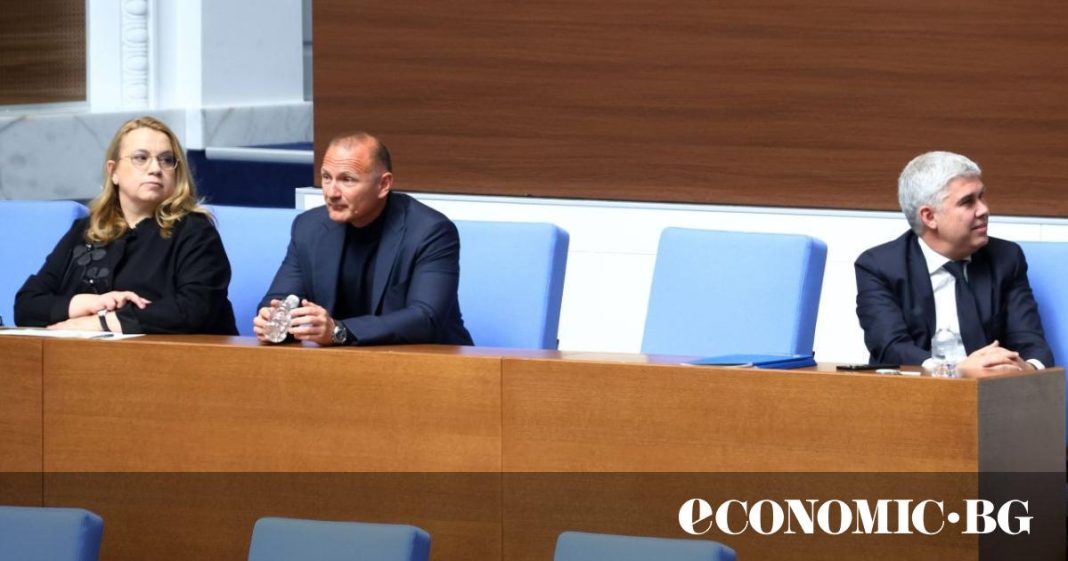From a missed flight to catamarans to ‘the biggest corruption deal’ in our history – the saga surrounding the long-term contract between Bulgargaz and the Turkish state-owned company Botas has sparked heated political debates in parliament, insults, serious accusations and serious doubts about the economic efficiency of the deal.
On Thursday, the National Assembly held a hearing on the case of former Bulgargaz director Denitsa Zlateva, former acting energy minister Rosen Hristov, Bulgartransgaz director Vladimir Malinov and energy minister Zhecho Stankov. It even got to the point where Hristov threatened to take the chair of the Energy Committee and ITN MP Pavela Mitova to court for asking him ‘what commission was taken for signing it,’ to which he replied that he had not taken any.
Is the contract great?
The thesis that this contract was necessary and beneficial for Bulgaria was defended by the former acting minister who signed it, Rosen Hristov.
Ivaylo Mirchev, MP from the PP-DB, started the hearing by saying that only one tanker of liquefied natural gas had been delivered under the deal, but Zlateva said that wasn’t true. She presented information on the quantities of gas that had passed through Turkey – for 2023, quantities of 664,000 MWh had been requested and received by Bulgargaz. MWh, for 2024 – 3 million MWh, and for the 25 years since the terminal in Alexandroupolis has been out of operation, the gas needed outside the supplies under the Azerbaijani contract and outside Chiren has been supplied at 2.6 million MWh. Hristov explained that, given that there were no operating terminals in Greece at the time and no contracts, the only option for supplying non-Russian gas was via Turkey.
Hristov explained that, given that there were no operating terminals or contracts in Greece at the time, the only option for supplying non-Russian gas was via Turkey. According to Denitsa Zlateva, the negotiations with the Turkish company on the conclusion of the contract were related to the seven tankers of American gas secured by the PP-DB government at the time, and this was the only option for the cargo to pass through Turkey, as Revitussa did not have the capacity.
I firmly stand behind this strategy – for Bulgaria to be independent of Russian supplies – yes, this contract is a key element and I would support its signing,“ Rosen Hristov replied when asked whether he would sign the deal again if it were happening now.
He explained that the contract term is long because energy companies do not work according to government schedules but take a long-term view.
If I had to sign a contract now, from the point of view of a commercial company, it would be in the interest of that company to have access to capacity at all terminals,“ Zlateva explained, adding that she would probably change the terms of the contract.
Who missed the boat?
During the hearings, Hristov and Zlateva presented a chronology of the meetings and discussions that preceded the signing of the agreement on 30 December 2021.
Negotiations with Botas began with a visit by President Rumen Radev to Istanbul on 9 December and continued on 11 December, 22 December and 24 December, again in Istanbul. Various representatives of Bulgarian companies and institutions participated in the various meetings, but it was not entirely clear who was where and when. On 24 December, the draft agreement was officially agreed and initialled by Botas, followed by its official signing on 30 December in Sofia.
An interesting moment in the hearing was the discrepancy between Hristov and Zlateva regarding who signed the agreement on 24 December in Turkey. When asked by MPs who had made him sign the agreement, Hristov replied:
No one forced me, my signature is on the protocol to which the provisional agreement reached during these meetings is attached. Why is my signature on the protocol? Because Ms Zlateva had to leave early and could not wait for the documents to be printed,“ he said.
He added that Denitsa Zlateva had to travel by plane, while he was travelling by car and was therefore able to wait for the documents to be printed.
Zlateva, for her part, replied that there was no way she could have missed her flight, as on 24 December, when the agreement was signed, she was in Sofia, not Istanbul.
I returned from Istanbul on 23 December and was not there on 24 December, I was in Sofia, I did not miss a flight,’ she said.
The role of President Radev
When asked whether President Rumen Radev had exerted pressure to sign the deal, all three respondents answered ‘no.’
He definitely did not exert any pressure on me,’ commented Rosen Hristov, adding that Radev had assisted Turkish President Recep Erdogan in granting Botas permission to negotiate with Bulgargaz.
He described this not as pressure, but as assistance in the negotiations initiated by the Bulgarian side ‘in connection with the wishes of a large part of those present here.’
Hristov also gave testimony about the deal to the State Agency for National Security, but it did not concern his relationship with the president.
Malinov was also adamant that he had not been pressured by the president or anyone else.
I gave my testimony, but there were no questions about pressure being exerted.’
The former director of Bulgargaz also stated that she had given testimony to the State Agency for National Security, but ‘I have no recollection of any questions related to influence being exerted on us.’
The deal turns out to be disadvantageous
We bought a vignette for a truck on a motorway where only light vehicles are allowed to drive,’ is how Stankov described the gas agreement.
Dimitar Gyurev from Vazrazhdane explained that the contract contains clauses that clearly show that it cannot be used to its full capacity. The contract is for 1.8 billion cubic metres of gas per year, but Bulgaria can only transport 1.3 billion cubic metres.
I can bet that no one will ever use this contract because its price is four times higher than the price through Greece,’ commented GERB MP and chairman of the Finance Committee, Delian Dobrev.
However, according to Hristov’s calculations, the price at the time of signing the agreement is comparable to what we were getting in Greece.
Hristov is adamant that the agreement is not being used effectively by the Bulgarian side and that we are not offering other companies to use it, and that there was only one such proposal during President Radev’s meeting in Hungary years ago, when they expressed interest and wanted to make a trial delivery.
Stankov, for his part, replied that such talks on how the capacity of LNG terminals in Turkey could be used had been held with Hungary and Moldova, and had also been proposed to Slovakia and even Austria.
You will be puzzled that they show specific calculations that natural gas delivery through terminals in Germany is much cheaper than the service we offer them under the contract with Botas.
‘This capacity, this service, these quantities cannot be used because they are unprofitable,’ added the energy minister.
The common ground with TPP Varna and Neochim
Rosen Hristov justified the parameters of the contract by saying that in a normally functioning economy, Bulgaria consumes 3.5 billion cubic metres per year, while currently we consume a billion less.
One of the reasons why the contract is not being fully utilised is the sharp drop in consumption resulting from the shutdown of two major consumers, TPP Varna and Neochim.
According to him, at the time of signing the contract, the two consumers stated that they intended to continue operating and, accordingly, consuming gas, but there was no way of predicting that they would cease operations.
Hristov also said that, given the economic forecasts for the country and the region, gas consumption is expected to grow.
„Our strategy has been part of Bulgargaz’s business to have international supplies, which stabilises the level of gas consumption and ensures that the exclusion of such sources does not account for double-digit percentages of the company’s turnover, but falls as low as possible,
Bulgargaz’s market share has shrunk, which he said has dropped from over 90% to 50%.
And why has the market share of the largest gas company in the country fallen? Because it has been deliberately placed in uncompetitive conditions.
According to him, private companies supply Russian gas, which is the cheapest in Europe, and private customers naturally switch to contracts with these companies in search of the greatest economic benefit.
Financial bleeding
According to Energy Minister Stankov, this contract is ‘financial bleeding for Bulgargaz.’ He explained that there is no termination clause unless the state pays the entire amount under the contract – over 4 billion levs, not counting the indexations due over the next 13 years. If these are included in the bill, Stankov is certain that the amount will swell to over BGN 5.5-6 billion.
Bulgargaz is currently like an ostrich – burying its head in the sand and keeping quiet, but that does not mean that BGN 1 million is not flowing out every day,“ said Delyan Dobrev.
According to him, Bulgargaz does not account for Botash’s invoices, which is why it does not consider them a loss.
There are no invoices, they have not been accounted for – there is no loss, Bulgargaz is doing well, but it is not, because it went bankrupt years ago,‘ he said, adding that the company is ’completely decapitalised.“
According to him, if the competent authorities conduct an audit of Bulgargaz, they will hold the director responsible for not declaring the company insolvent in accordance with commercial law.
Stankov added that he has already organised two meetings with the Turkish Minister of Energy and that work on renegotiation is continuing.
No one can renegotiate or terminate this contract,’ Dobrev said categorically.
According to him, after the hearing in the National Assembly, the conclusion was confirmed that „this is the most amateurish work ever done by a government or the biggest corruption deal.
‘It turns out that we are signing a long-term contract for 13 years and ordering something we do not need.’
He compared the deal to a ‘war’ that Bulgaria did not wage with Turkey, with the Bulgarian energy sector capitulating to Turkey within the framework of a caretaker government.
Преведено с DeepL.
Източник: Economic.bg


